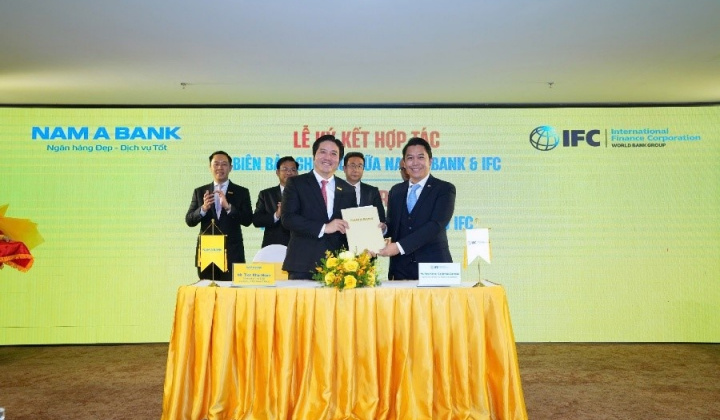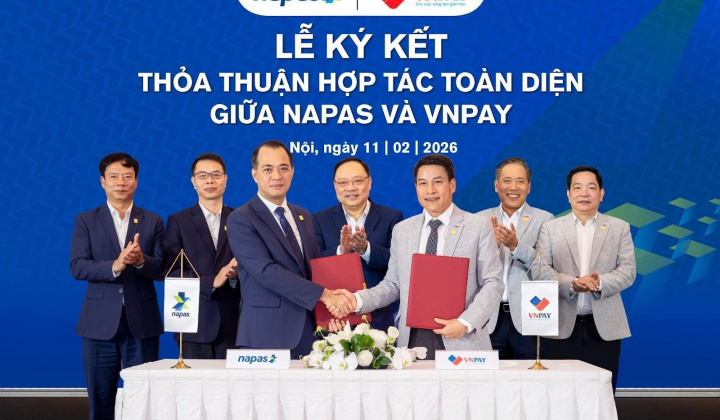In his speech, Dr. Nguyen Quoc Hung said that the Consumer Finance Club is a voluntary organization under the Vietnam Banking Association, gathering finance companies licensed to operate legally in Vietnam. The club operates on a non-profit basis, has legal status and its own seal, with the aim of: Connecting members; Supporting and protecting the legitimate rights and interests of members; Contributing to the development of the consumer finance industry and the country's socio-economic development.

Dr. Nguyen Quoc Hung, Vice President and General Secretary of VNBA
Dr. Nguyen Quoc Hung emphasized the role of the Club as a bridge between finance companies and management agencies. At the same time, he suggested that the Club should increase its proactiveness, practicality and coordination to remove obstacles in the industry, contributing to the development of the consumer finance market in a healthy, transparent and sustainable manner.
To realize this goal, Dr. Nguyen Quoc Hung proposed that the Executive Board consider establishing a permanent Working Group, which acts as a focal point to collect members' difficulties, research, analyze based on legal regulations and send recommendations to VNBA so that the Association can represent them to work with State management agencies.
On behalf of the Executive Board, Mr. Nguyen Dinh Duc - Chairman of the Consumer Finance Club presented 3 key goals for the term, including: unifying the action program, synthesizing and recommending solutions to difficulties, and assigning specific tasks to each member.
Mr. Nguyen Dinh Duc said that the pilot mechanism for sharing data through the national data platform is expected to be launched next August. At that time, financial companies will coordinate to discuss in detail the sharing method, data type, scope and operating mechanism, ensuring efficiency, transparency and compliance with the law.
The Chairman of the Consumer Finance Club affirmed that participating in data sharing through the national data platform is a great opportunity for financial companies to legalize information sharing activities. When the parties agree on the process, standards and legal corridor for this activity, a legitimate mechanism will be formed, protecting the legitimate rights of the participating parties.
This will help reduce credit risks, especially in the unsecured lending model. At the same time, it will prevent fraud and limit the situation where bad actors take advantage of data gaps between units.
In addition, an important task that the Chairman of the Consumer Finance Club noted is to strengthen communication to raise social awareness. Communication needs to help people clearly identify the legitimate and transparent role of consumer finance companies. Thereby, helping people clearly distinguish between formal consumer finance and black credit. In particular, it will enhance the financial responsibility and debt repayment obligations of borrowers, thereby building healthy financial behavior, contributing to social stability and market development.
In the medium term, Mr. Duc proposed to study the development of a Citizen Credit Index, similar to the model of some countries. This will be a tool to assess the level of financial compliance of individuals and can integrate appropriate sanctions (such as restricting exit, restricting access to public services for those who deliberately do not pay their debts). Currently, the centralized credit data system exists but is not strong enough. Therefore, it is necessary to build a more unified and transparent data warehouse, with coordination between the State Bank, the Ministry of Public Security and relevant agencies.

Mr. Nguyen Dinh Duc - Chairman of the Consumer Finance Club
According to Mr. Duc, currently many legal regulations (Decrees 55, 57, 68... are still inadequate, not keeping up with the rapid development of the industry, especially in the context of the emergence of many forms of P2P lending, high technology applications, the need to increase loan limits and the requirement to classify businesses more appropriately... Therefore, the Club will establish a specialized legal team to review and synthesize the shortcomings in the current legal system to make recommendations to the authorities to improve the legal mechanism.
At the meeting, the members of the Club's Executive Board focused on discussing core issues in the operations of consumer finance companies, and proposed specific solutions to enhance connectivity, information sharing, and improve the legal framework to support industry development.
Accordingly, the members of the Club's Executive Board agreed on 5 major focuses including: (1) Sharing data through the national data platform. Specifically, consumer finance companies agreed on the policy of participating in a shared data platform, ensuring compliance with the law, contributing to reducing credit risks and fraud.
(2) Communication to raise social awareness of consumer finance. Accordingly, strengthen communication about the legitimate and transparent role of consumer finance companies, helping people distinguish clearly from black credit, thereby forming healthy financial behavior.
(3) Proposal to improve the legal mechanism. The members of the Club's Executive Board agreed to establish a legal team to summarize the shortcomings and propose amendments to regulations such as Circular 39, Decrees 55, 57, 68, etc. to suit the reality and market needs.
(4) On anti-fraud and enhancing effective debt collection. The members of the Club's Executive Board agreed to propose establishing a common warning system, regular meetings between companies to share fraud patterns, new tricks, hot spots by region or POS.
(5) Key recommendations sent to the State Bank and management agencies on the proposal to increase the consumer loan limit, the ceiling of 100 million VND stipulated in Circular 43/2016/TT-NHNN has become outdated after more than a decade, and needs to be adjusted to suit reality and inflation. At the same time, loosen regulations on cash disbursement, distinguishing between disbursement "in real cash" and "transfer to customer accounts".

Overview of meeting
In addition to recommendations on the legal framework, the Consumer Finance Club also proposed adjusting the consumer lending ratio from the current 30% to a minimum of 50% or higher, depending on the risk management capacity of each company. This adjustment aims to ensure greater flexibility in business operations, in accordance with the specific model and scale of each non-bank credit institution.
To enhance operational efficiency and connectivity among members, the Club's Executive Board proposed a number of specific solutions: Organize regular monthly thematic meetings to promptly exchange, discuss and handle issues arising in practice; Establish a common information sharing platform and build an internal data warehouse, supporting risk warning, fraud detection and effective debt collection coordination; Continue to organize professional seminars, professional training programs, promote digital transformation and technology application throughout the consumer finance industry.
These activities not only contribute to improving the operational capacity of member companies, but also create an environment of close coordination, transparency and efficiency throughout the Club.
T.Đ




















